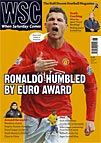 A desire for independence is leaving Moldovan football strong hold Transdniestria isolated, writes Mark Gilbey
A desire for independence is leaving Moldovan football strong hold Transdniestria isolated, writes Mark Gilbey
It’s almost the midway point in Moldova’s Divisia Nationala and one team is way out in front, as always. League leaders Sheriff Tiraspol have won the past eight Moldovan championships despite being based in Transdniestria, a pro-Russian separatist state in this country that used to be part of the Soviet Union.
More than a thousand people were killed in a war for independence that ended in 1992 without resolving Transdniestria’s future. The Sheriff company was founded by former officers of the Tiraspol police force and is run by the schismatic republic’s president, Igor Smirnov, owning everything from casinos to supermarkets. Sheriff’s unbridled spending power in Europe’s poorest country has allowed them to snap up the best local players and a host of talent from South America and Africa.
At Sheriff’s world-class academy they are nurturing more than 400 youngsters, a third of whom live at the centre, receiving a full-time education and training from some of the region’s best coaches. It is just a small part of a 40-hectare complex built in 2002 that boasts an Olympic-sized swimming pool and luxurious accommodation for the first-team squad. Few tourists make it to Tiraspol, but one notable visitor was FIFA head Sepp Blatter, who called the complex “beautiful”, a comment that was widely trumpeted by President Smirnov. The complex and its adjoining Mercedes-Benz showroom sit incongruously at the centre of a maze of rundown concrete tower blocks, home to residents who earn the equivalent of just £125 a month.
The Sheriff stadium was the unlikely venue for Moldova’s first 2010 World Cup qualifying game, a 2-1 defeat against Latvia in September. Coach Igor Dobrovolski led his side out to a sea of empty yellow seats – there were no Moldovan flags, no banners urging the team on and only a few thousand fans inside the ground. Some travelling east to Tiraspol were turned away at the Dniester, the river that forms the natural border between Moldova and Transdniestria, by the separatist state’s army. Those that managed to make it to the ground had their flags and banners confiscated by police.
A five-star luxury hotel is currently under construction for visiting foreign teams, but these could be few and far between. In his post-match interview, Dobrovolski lamented the dead atmosphere in the stadium and said he would ask the federation to play future matches in the national capital, Chisinau, which had staged all such fixtures until 2003. Since then some games have been held in Tiraspol as a sideswipe at Smirnov’s government, serving to demonstrate that Transdniestria is technically still within Moldova’s borders.
Matches between Sheriff and the Moldovan capital’s biggest team, Zimbru Chisinau (who briefly played in the Soviet top level under a former name), are often highly volatile, with separatist supporters vociferously chanting for independence while displaying provocative banners and the red-and-green flag of Transdniestria. League football in an independent state is Sheriff chairman Victor Gusan’s ambition, one that would devastate the Moldovan league – one third of the 12 teams in the top division are from the breakaway region. The effect on Moldova’s national team would be equally ruinous – five of Dobrovolski’s starting XI against Latvia plus four of the substitutes would be eligible to play for Transdniestria. Another region, Gagauzia, where the population is largely Turkic-speaking, had also sought independence but settled for greater autonomy within Moldova. It is hardly a football hotbed, however. The Gagauzians’ national side, unrecognised by FIFA, played their first game against Greenland in 2006, slumping to a 2-0 defeat in the ELF Cup.
Amid nationalist strife in Moldovan football there is one bright spot on the horizon, in 16-year-old midfield prodigy Masal Bugduv, whom many predict will soon be playing his football in a major European league. Best of all, he has no connection to any breakaway regions.
From WSC 263 January 2009